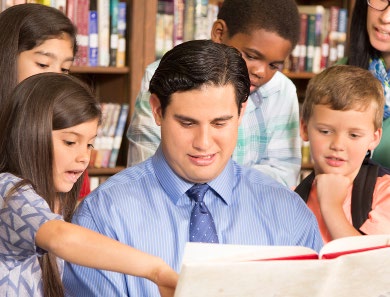Back to series


Questions and Answers: What Does It Mean To Have Faith?
Learn more in our Dawn Treader Magazine
 Samantha: Hi, Polly! Can I talk with you for a minute?
Samantha: Hi, Polly! Can I talk with you for a minute?
Polly: Sure. But I warn you in advance, that if you spend any length of time with me, I might end up inviting you to Bible study again.
Sam: That’s okay. I’m not one of those people who take offense at those who follow Jesus, just because I don’t myself. Matter of fact, I quite appreciate all the things that Christians do to help the world — that’s what I wanted to talk with you about.
Pol: Yes?
Sam: Why is it that you all act so differently, and don’t try to fit in with the usual way of the world? And you’re so confident in what you know. You even think that you can judge matters of right and wrong.
Pol: I don’t; God does. And He has given His followers authority to carry out His laws here on earth. “Do you not know that the saints shall judge the world? And if the world be judged by you, are you unworthy to judge the smallest matters … that pertain to this life?… the unrighteous shall not inherit the Kingdom of God” (1 Corinthians 6:2-3, 9).
 Sam: Whew! Those are strong words, Polly! That’s what I don’t get: how can you claim, as a follower of Jesus, to have some special authority for what you do, that makes you brave enough to take on the entire world? And without even being defensive.
Sam: Whew! Those are strong words, Polly! That’s what I don’t get: how can you claim, as a follower of Jesus, to have some special authority for what you do, that makes you brave enough to take on the entire world? And without even being defensive.
Pol: It’s God’s authority over the world that He created. Our job as His followers is to do all we can to see that His orders are carried out in the world. We don’t have to defend Him; in fact, He defends us, as Our King.
Sam: That’s not the idea I generally get of kings. Aren’t most of them tyrants?
Pol: Human kings are fallible, just like the rest of us, and power to rule brings with it gigantic opportunities for misuse as well as good. However, a good human monarch could be a great example to others of how God works in His Kingdom. C.S. Lewis tried to show this in his Chronicles of Narnia, with Peter the High King and Caspian and many of the other Narnian rulers. Doing good and taking care of their subjects without fear or consideration for themselves was the whole point of being the king. That’s because they were all copying the example of Aslan, “The High King above all kings,”1 who of course was based upon Jesus and His authority and example as the Savior King, who died for His people before He was exalted to the right hand of God.
Sam: But how does that impact the everyday life of His followers? I mean, you’re not all kings and queens.
Pol: I wouldn’t say that! As adopted children of God, that makes us all part of the Heavenly royal family. We are meant to live our lives here on earth as “ambassadors,” if you like, of that Heavenly Kingdom of which we are not only citizens, but chosen children, princes and princesses (Luke 22:29-30).
Sam: That would seem likely to make you feel that you were better than everyone else.
 Pol: No, because we have no greater claim on our King and His Righteousness than anybody else. The only difference is that we know Who He is, what He wants done here on earth and what He has planned for us in the eternal Heavenly future, while not everyone else does. Followers of Christ don’t have a special ability to brag about, but a special message to share. As C.S. Lewis explained, “God is love, and that love works through men — especially through the whole community of Christians … if you want joy, power, peace, eternal life, you must get close to, or even into, the thing that has them. They are not a sort of prize which God could, if He chose, just hand out to anyone. They are a great fountain of energy and beauty spurting up at the very center of reality. If you are close to it, the spray will wet you: if you are not, you will remain dry.”2 So that’s what becoming a citizen of God’s Kingdom is all about. He’s the King, and the closer you are to Him, the more of His royal goodness and favor and excitement in life you will absorb.
Pol: No, because we have no greater claim on our King and His Righteousness than anybody else. The only difference is that we know Who He is, what He wants done here on earth and what He has planned for us in the eternal Heavenly future, while not everyone else does. Followers of Christ don’t have a special ability to brag about, but a special message to share. As C.S. Lewis explained, “God is love, and that love works through men — especially through the whole community of Christians … if you want joy, power, peace, eternal life, you must get close to, or even into, the thing that has them. They are not a sort of prize which God could, if He chose, just hand out to anyone. They are a great fountain of energy and beauty spurting up at the very center of reality. If you are close to it, the spray will wet you: if you are not, you will remain dry.”2 So that’s what becoming a citizen of God’s Kingdom is all about. He’s the King, and the closer you are to Him, the more of His royal goodness and favor and excitement in life you will absorb.
Sam: But it just doesn’t seem fair that people are kept from enjoying those Kingdom benefits just because they haven’t heard about it yet.
Pol: Well, as Lewis put it, “if you are worried about the people outside, the most unreasonable thing you can do is to remain outside yourself. Christians are Christ’s body, the organism through which He works. Every addition to that body enables Him to do more. If you want to help those outside you must add your own little cell to the body of Christ who alone can help them. Cutting off a man’s fingers would be an odd way of getting him to do more work.”3
Sam: But I don’t know how to act like a Kingdom citizen, let alone a member of a Royal Family!
Pol: Well, if you’ll come along to Bible study with me, you just might start finding out!
Ask your children
What do you think about Polly’s answers to Samantha’s questions? Do you have any other questions of your own that this dialogue has brought up for you? Challenge them to think up more responses they could give, if someone asked them a question like Samantha’s.
Notes.
1C.S. Lewis, The Horse and His Boy (New York: HarperCollinsPublishers, 1954), p. 166.
2 C.S. Lewis, Mere Christianity, 50th Anniversary ed. (London: HarperCollinsPublishers, 2002), p. 176.
3 Ibid, p. 64.
C.S. Lewis Institute
Author
C.S. Lewis Institute, in the legacy of C.S. Lewis, works to develop wholehearted disciples of Jesus Christ who will articulate, defend, share, and live their faith in personal and public life. Founded in 1976 by Dr. James Houston and James R. Hiskey, the Institute provides leading teachers who address important issues of the day from the perspective of Biblical orthodoxy, while also providing discipleship for individuals in small groups.

 COPYRIGHT: This publication is published by C.S. Lewis Institute; 8001 Braddock Road, Suite 301; Springfield, VA 22151. Portions of the publication may be reproduced for noncommercial, local church or ministry use without prior permission. Electronic copies of the PDF files may be duplicated and transmitted via e-mail for personal and church use. Articles may not be modified without prior written permission of the Institute. For questions, contact the Institute: 703.914.5602 or email us.
COPYRIGHT: This publication is published by C.S. Lewis Institute; 8001 Braddock Road, Suite 301; Springfield, VA 22151. Portions of the publication may be reproduced for noncommercial, local church or ministry use without prior permission. Electronic copies of the PDF files may be duplicated and transmitted via e-mail for personal and church use. Articles may not be modified without prior written permission of the Institute. For questions, contact the Institute: 703.914.5602 or email us.
Speakers

C.S. Lewis Institute
Author
Team Members
C.S. Lewis Institute
Author
C.S. Lewis Institute, in the legacy of C.S. Lewis, works to develop wholehearted disciples of Jesus Christ who will articulate, defend, share, and live their faith in personal and public life. Founded in 1976 by Dr. James Houston and James R. Hiskey, the Institute provides leading teachers who address important issues of the day from the perspective of Biblical orthodoxy, while also providing discipleship for individuals in small groups.


